Cancer in Maryland

When one looks at cancer in Maryland there are approximately 32,000 cases in a given year. In 2017, the last year for which there is full data, the most commonly diagnosed cancer was breast cancer. Approximately 1% (50) of the 5000 or so Marylanders diagnosed with breast cancer in 2017 were men. Prostate cancer was the second most commonly diagnosed cancer, followed by cancer of the lung which is also known as cancer of the lung and bronchus, followed by cancer of the colon and rectum which is sometimes referred to as colorectal cancer. Other commonly diagnosed cancers in Maryland include melanoma, non-Hodgkin’s lymphoma, and cancer of the uterus. There are at least 100 different types of cancer and these are the most common.
-
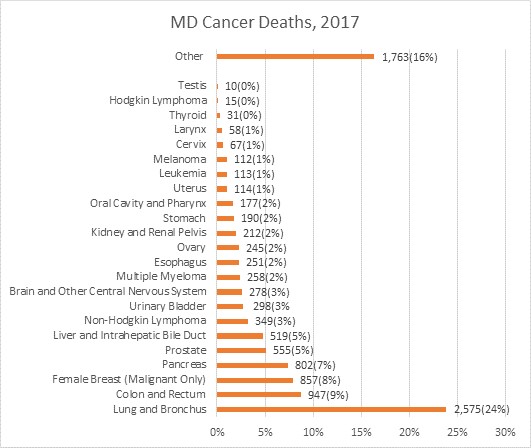
The most common cause of cancer death is cancer of the lung and bronchus. Approximately 24% of all cancer deaths are cancer of the lung and bronchus. The second most common cause of cancer death in Maryland was from cancer of the colon and rectum or colorectal cancer. Approximately 9% of all cancer deaths in Maryland were from colorectal cancer. Third was breast cancer at 8% followed by pancreatic cancer at 7%, prostate cancer at 5%, and liver cancer at 5%. There are number of other types of cancer, but they cause fewer deaths than these the leading causes of cancer death in Maryland.
Note: Epidemiologists commonly show incidence and mortality in rates per 100,000 that is the number of people getting a disease for every 100,000 people in the population. This allows for accurate comparison of risk in one population in an area where there may be a large number of people to another area which may be somewhat smaller in population.
-
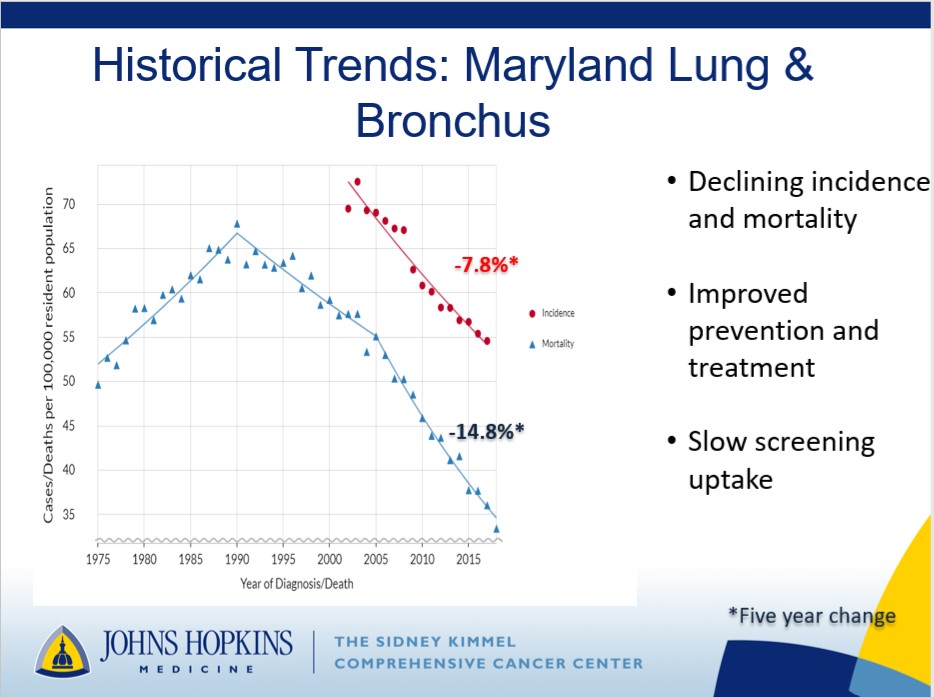
This graph shows us the trends in cancer of the lung and bronchus for incidence and death. The death rate is shown from 1975 rising and peeking in 1990 and then going down from 1990 to 2017. You will also note in red the incidence from the year 2000 to 2017. It has also gone down dramatically. The decline in incidence and the decline in mortality is overwhelmingly driven by a decline in use of tobacco especially cigarette smoking that began in Maryland in the late 1950s for men in mid-1960s for women. The continuation of this decline should lead to further declines in lung cancer death rates him well into the future of him..
-
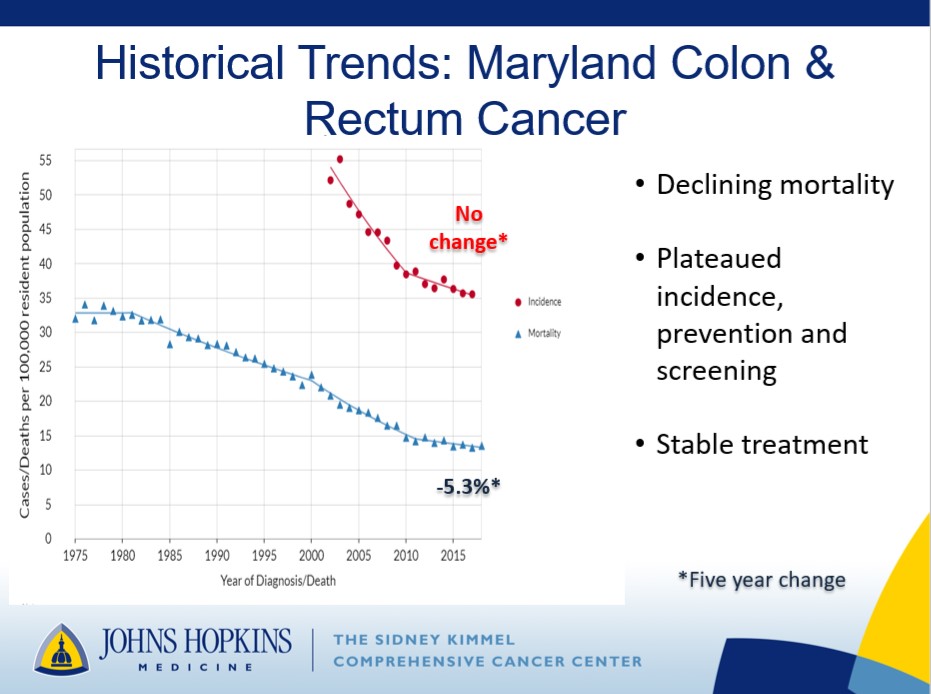
This graph shows the decline in death and incidence rates for cancer of the colon and rectum. You will note that cancer the colon and rectum has been declining in terms of death rate or risk of death since 1980. The decline in incidence rate from 2000 onward is shown in red. Please note that the decline in both incidence and colorectal cancer death rate is due to improvements in screening and treatment of colorectal cancer.
-

This shows the incidence and mortality rates from breast cancer in Maryland. Breast cancer death rates have gone down considerably starting about 1990. The incidence rate shown in red has had some volatility. Some think that the volatility is linked to use of postmenopausal hormones which is varied over the last 20 years.
-
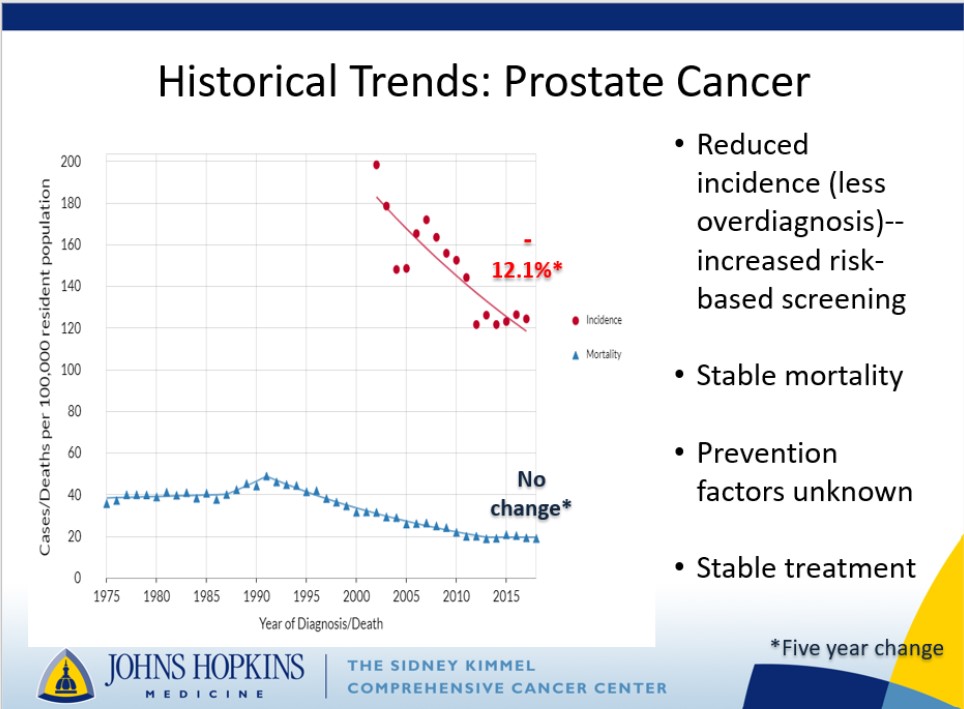
This shows incidence and mortality of prostate cancer. Mortality is shown from 1975 to 2017. There has been a decline in prostate cancer mortality since 1991. The incidence has gone down since 2000. Some of the decline in prostate cancer mortality may be due to screening and treatment of localized disease. This is a matter of controversy as screening diagnoses a lot of indolent disease that does not need to be treated. Many men suffer the side effects of treatment for a disease that was never a threat to their life. Please note that all major organizations that issue prostate cancer screening guidelines recommend that men be told of the potential risk and potential benefits of screening and be encouraged to make a choice. No organization outright recommends prostate cancer screening.
-
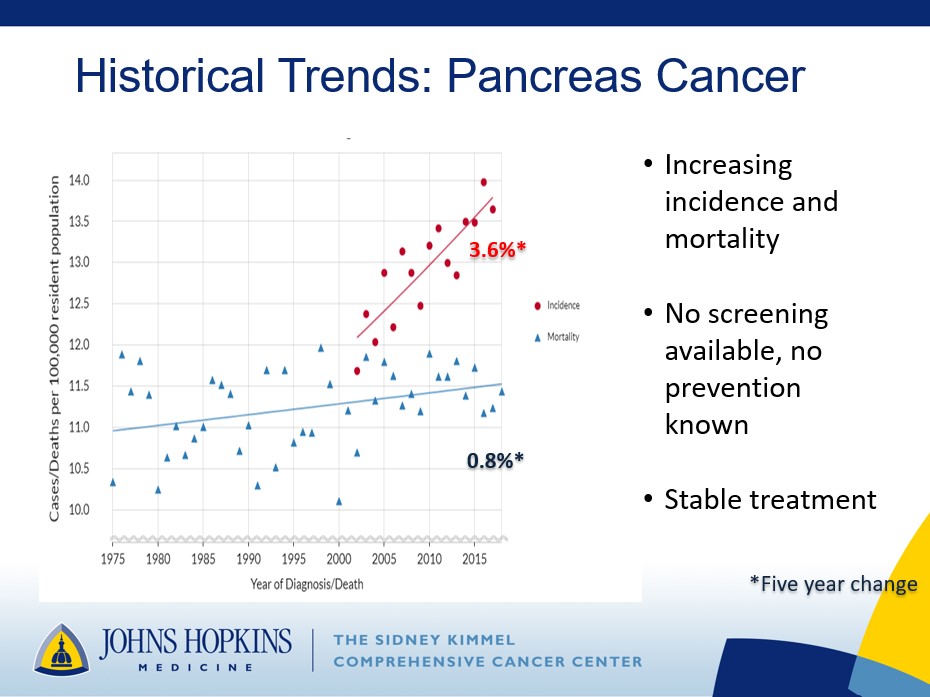
Pancreas cancer is a disease in which the incidence and mortality are both growing. At this time, there is no screening test for pancreatic cancer. The causes of pancreatic cancer are largely unknown. Treatments do seem to be improving, but this is a special area of need in oncologic research.
-
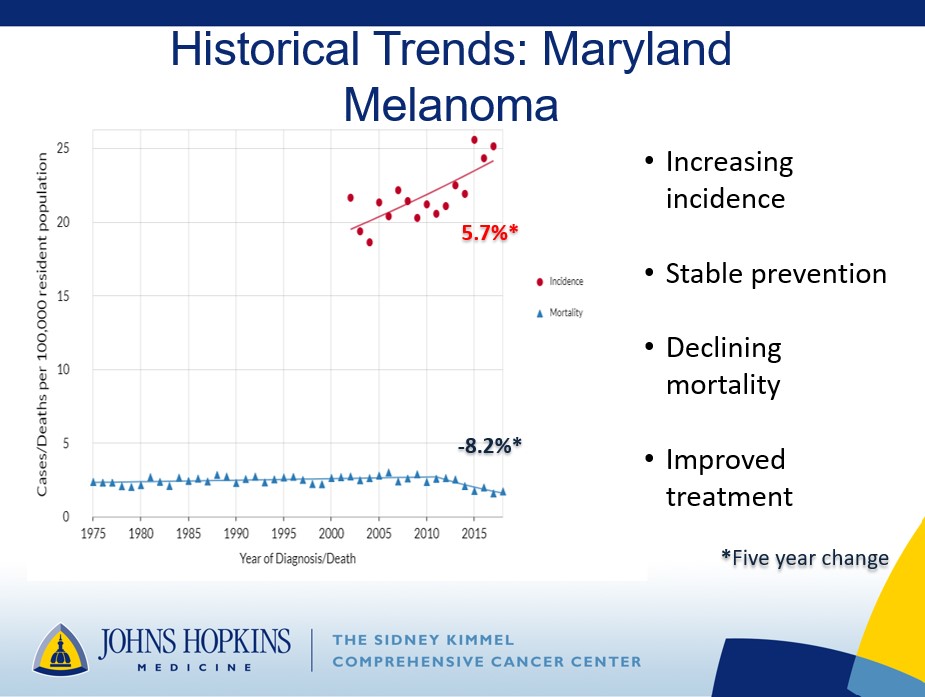
Melanoma is a disease of the skin. It does occur in dark skinned people but is more common in light-skinned people. In recent years melanoma incidence has been increasing while melanoma mortality has been declining. Interestingly, we know that some avoidance and wearing of clothing that covers the skin reduces risk of melanoma. We do not have evidence that sunscreen and sunblock reduces risk of melanoma.
Cigarette Restitution Fund at Johns Hopkins
Collaborations with our many partners throughout Maryland have allowed us to educate our citizens about cancer prevention and detection. Our goal is not only to teach people about cancer screening services, but to guide and support them as they put what they’ve learned into place.
William Nelson Discusses Tobacco Funds' Impact on Research
FY2020 Awards
-
Valsamo Anagnostou, M.D., Ph.D.
Department of Oncology (SOM)
Evolution of Neoantigen Landscapes during Immunotherapy in NSCLCAnna Beavis, M.D., M.P.H.
Department of Obstetrics and Gynecology (SOM)
Addressing rising obesity and gynecologic cancer risks through primary prevention: a risk prediction model to guide screening for endometrial hyperplasia and cancer in obese womenOtis Brawley, M.D.
Departments of Oncology (SOM) and Epidemiology (SPH)
Reduction of the cancer burden in the SKCCC catchment area through disparities eliminationVincent Lam, M.D.
Department of Oncology (SOM)
Longitudinal circulating tumor DNA profiling of resected esophageal cancer for early recurrence detection and characterization of tumor clonal evolutionCatherine Handy Marshall , M.D., M.P.H.
Department of Oncology (SOM)
Modifiable risk factors in cancerKarisa Schreck, M.D., Ph.D.
Department of Neurology (SOM)
Determining predictors of response and resistance to RAS effector targeted therapiesTanguy Seiwert, M.D.
Department of Oncology (SOM)
A novel model system to optimize immunotherapy for oral cancer patients using a histoculture-bioreactor systemJennifer Sheng , M.D.
Department of Oncology (SOM)
An adaptive weight loss program in overweight or obese breast cancer survivorsJessica Tao, M.D.
Department of Oncology (SOM)
Circulating Tumor DNA as a screening biomarker for aggressive breast cancerGed, Yasser, M.D.
Department of Oncology (SOM)
Impact of Skeletal muscle loss on Immune Checkpoint Inhibitors outcomes in Kidney CancerJelani Zarif, M.D.
Department of Oncology (SOM)
Targeting M2-Tumor Associated Macrophages (M2-TAMs) in Prostate Cancer -
Alexander Baras, M.D., Ph.D.
Department of Pathology (SOM)
Leveraging clinical somatic mutation profiling of malignancies with modern electronic health records to better characterize etiologic, prognostic, and therapeutic associationsJoseph Bressler, Ph.D.
Kennedy Krieger Institute (JHI) and Department of Environmental Health and Engineering (SPH)
The E-Cigarette Sweetener Ethyl Maltol Enhances Metal Transport and DNA DamageNamandje N. Bumpus, Ph.D.
Department of Pharmacy (SOM)
Development of a Novel Class of Bim Activators as Chemotherapeutic AgentsGeetanjali Chander, M.D., M.P.H. and Heidi E. Hutton, Ph.D.
Department of Medicine (SOM) and Department of Psychiatry and Behavioral Sciences (SOM)
Development, cultural adaptation and piloting of an avatar delivered smoking cessation intervention for low income smokers in Baltimore CityPeter Espenshade, Ph.D.
Department of Cell Biology (SOM)
Targeting SREBP Cleavage Activating Protein (SCAP) in CancerEd Gabrielson, M.D.
Department of Pathology (SOM)
Inhaled particulate matter and accelerated growth of heterotopic cancersMary Carol Jennings, M.D., Ph.D. and Anne Rositch, Ph.D.
Department of Technical Leadership & Innovation (SOM), and Department of Epidemiology (SPH)
Developing a novel Geospatial database of HPV vaccine access points across Maryland and the Eastern Shore: building the evidence base to target rural disparities in cervical cancerNorma Kanarek, M.P.H., Ph.D.
Department of Environmental Health and Engineering (SPH)
Understanding Smoking Behaviors in Baltimore CityElizabeth Platz, Sc.D., M.P.H.
Department of Cancer Prevention and Control Biostatistics Core for Research and ProposalsClaire Snyder, Ph.D.
Department of Medicine (SOM) and Medicine (SOM)
PRO-cision Medicine: Pilot-Testing to PRO System and Patient-Centered Strategy for Cancer CareKala Visvanathan, MD
Department of Epidemiology (SPH)
Using Artificial Intelligence (AI) to address the clinical need for timely high-quality germline testing on cancer patientsJessica Yeh, Ph.D.
Department of Medicine (SOM) and Department of Epidemiology(SPH)
Behavioral lifestyle intervention in overweight or obese cancer survivors in Maryland: A dissemination and implementation studyCynthia Zahnow, Ph.D.
Department of Environmental Health and Engineering (SPH)
Alcohol exposure alters the epigenome to increase breast cancer
FY2021
-
Anna Beavis, M.D., M.P.H.
Funded: FY21 (Continuation)
Addressing rising obesity and gynecologic cancer risks through primary prevention: a risk prediction model to guide screening for endometrial hyperplasia and cancer in obese womenOtis Brawley, M.D.
Funded: FY21 (Continuation)
Reduction of the cancer burden in the SKCCC catchment area through disparities eliminationVincent Lam, MD
Funded: FY21 (Continuation)
Longitudinal circulating tumor DNA profiling of resected esophageal cancer for early recurrence detection and characterization of tumor clonal evolutionCatherine Handy Marshall , M.D., M.P.H.
Funded: FY21 (Continuation)
Modifiable risk factors in cancerKarisa Schreck, M.D., Ph.D.
Funded: FY21 (Continuation)
Targeting SHP2-dependent adaptive resistance to RAF inhibition in BRAF-mutated gliomaTanguy Siewert, M.D.
Funded: FY21 (Continuation)
A novel model system to optimize Immunotherapy for Oral Cancer Patients using a Histoculture – Bioreactor SystemJennifer Sheng , M.D.
Funded: FY21 (Continuation)An adaptive weight loss program in overweight or obese breast cancer survivorsJessica Tao, M.D.
Funded: FY21 (Continuation)
Circulating Tumor DNA as a Screening Biomarker for Aggressive Breast CancerJelani Zarif, M.D.
Funded: FY21 (Continuation)
Targeting M2-Tumor Associated Macrophages (M2-TAMs) in Prostate Cancer -
Otis Brawley, M.D. and Norma Kanarek, Ph.D.
Funded: FY21 (New)
Engaging the Johns Hopkins Health System in Research to Reduce the Burden of Cancer in the SKCCC Catchment AreaRobert Brown, M.D.
Funded: FY21 (New)
Morbid obesity, bariatric surgery, and proteomic measurements of the reduced risk of liver cancerNamandje N. Bumpus, Ph.D.
Funded: FY21 (Continuation) Development of a Novel
Development of a Novel Class of Bim Activators as Chemotherapeutic AgentsGeetanjali Chander, M.D., M.P.H. and Heidi E. Hutton, Ph.D.
Funded: FY21 (Continuation)
Pilot RCT of an avatar delivered smoking cessation intervention for low income hospitalized smokers in Baltimore CityAlan D. Friedman, Ph.D.
Funded: FY21 (New)
EGFR-Targeted Activated Myeloid Cells as a Novel Immunotherapy for Lung Cancer
Funded: FY21 (Continuation)
Tobacco Free Community InitiativePanagis Galiatsatos, MD
Funded: FY21 (New)Jacky Jennings, Ph.D.
Funded: FY21 (New)Norma Kanarek, M.P.H., Ph.D.
Funded: FY21 (Continuation)
Understanding Smoking Behaviors in Baltimore CityDina Lansey, M.S.N.
Funded: FY21 (New)
Identifying Barriers to Therapeutic Clinical Trial Participation Using Clinical Trial Candidate DataFunded: FY21 (Continuation)
Cancer Prevention and Control Biostatistics Core for Research and ProposalsFunded: FY21 (New)
Periodontal pathogens and risk of cancer in a cohort that includes Marylanders from Washington CountyFenna Sille, Ph.D.
Funded: FY21 (New)
Investigating how arsenic from cigarette smoke and drinking water exposures causes lung cancerClaire Snyder, Ph.D.
Funded: FY21 (Continuation)
PRO-cision Medicine: Refining a Patient-Centered Strategy for Cancer CareKala Visvanathan, MD
Funded: FY21 (Continuation)
Using Artificial Intelligence (AI) to address the clinical need for timely high-quality germline testing on cancer patientsJessica Yeh, Ph.D.
Funded: FY21 (Continuation)
Behavioral Weight Loss for Overweight or Obese Cancer Survivors in Maryland: ASPIRE StudyJames Zabora, Sc.D.
Funded: FY21 (Continuation)
Evaluation of the Johns Hopkins Center to Reduce Cancer Disparities’ Community Advisory Groups (CAGs)-Part IICynthia Zahnow, Ph.D.
Funded: FY21 (Continuation)
Alcohol exposure alters the epigenome to increase breast cancer

